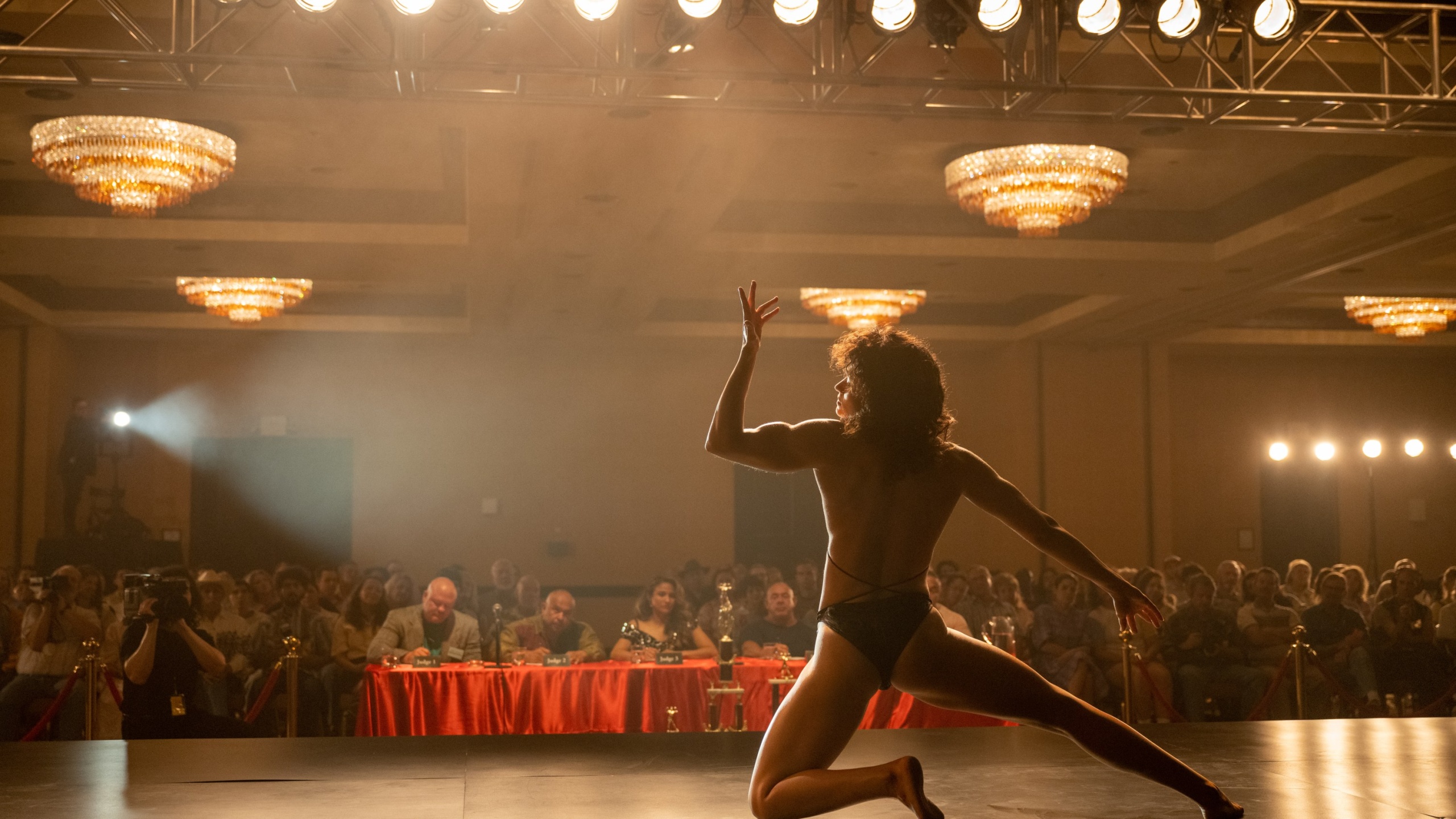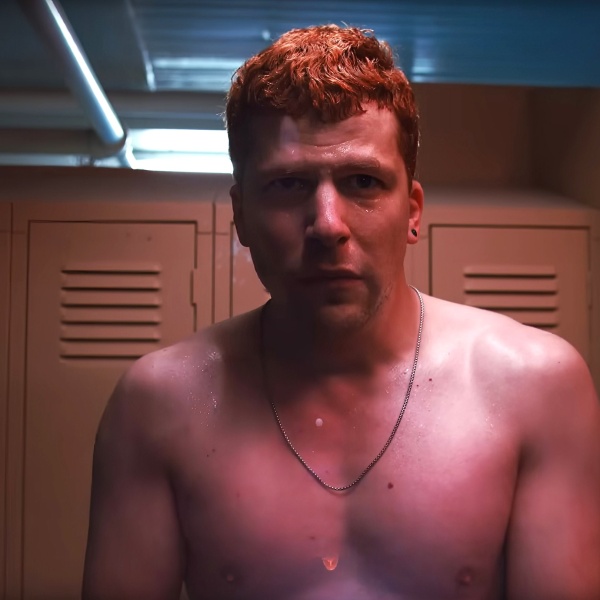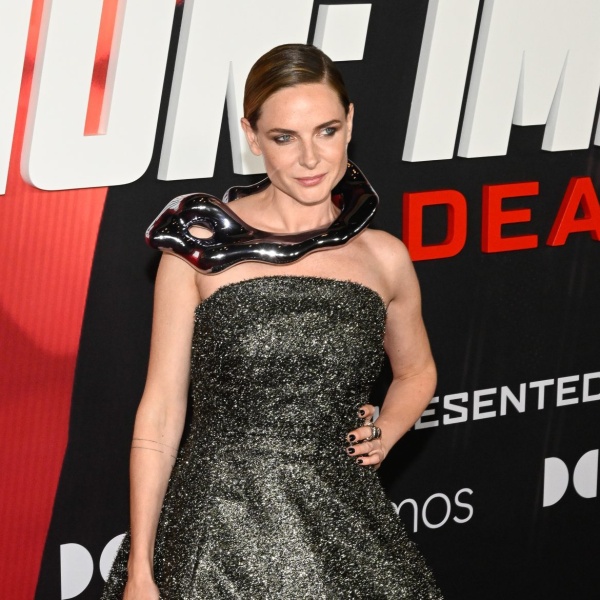[Editor’s note: The following interview contains major spoilers for “Love Lies Bleeding” and its ending.]
If you’ve already seen “Love Lies Bleeding,” there are surely a few images from the film you’re still scraping off your brain. Rose Glass’ 1980s Southwest-set midnight movie centers on the volatile but nevertheless unavoidable romance between Lou (Kristen Stewart), a bored lesbian gym manager, and Jackie (Katy O’Brian), the ‘roid-raging bodybuilder who sweeps into town to save Lou from her small-town ennui.
But as the pair fall in love, the corpses pile up — and so do the heads as, after a steroid-addled Jackie brutally murdered the be-mulleted wife-beater JJ (Dave Franco), who’s married to the abuse-dazed Beth (Jena Malone), who also happens to be Lou’s sister. Meanwhile, hanging over everything is Lou and Beth’s father, the gnarly, bug-eating gangster Lou Sr. (Ed Harris), with his share of secrets, in the form of bodies and smuggled arms in the depths of a nearby canyon.
While the movie’s sex scenes have stirred plenty of chatter, what about its bone-crushing, even balletic violence? The image of Franco’s unceremoniously crushed skull is one the movie returns to with increasing closeness, with his murder (one the audience will surely be cheering for) at first shown in the shadows before later being seen in all its glory, care of a rancid close-up courtesy DP Ben Fordesman.
“Sometimes the aftermath of violence just has a bit more impact,” Glass, who co-wrote the film with Weronika Tofilska, told IndieWire during a recent interview. Glass said that depicting Franco’s grisly death was “like a fun choreography exercise. That [Jackie] smashes his head just felt like the imagination of the feeling that maybe was in that moment more impactful offscreen. Then the aftermath becomes like a punchline as well. It’s gleefully irreverent, I guess.”
Glass said there was some fervent discussion with the film’s backers — including producers Andrea Cornwell and Oliver Kassman, who produced Glass’ feature debut “Saint Maud” — over just how many times to show JJ’s death.
“We did maybe show it one or two more times than we do in the film, and then we get to the notes, and they were the right ones, to only show it a slightly more select amount of times,” Glass said. “Our VFX company, Time Based Arts, based in London, they basically created the whole look of what, I was [said was], ‘His face just has to be completely messed up.” (Upon Jackie’s initial blow upon JJ during a sneak home invasion attack, you see his utterly dislocated jaw swinging from his skull in the aftermath.)

“We filmed Dave, a plate of him, with lots of red on his face, but all the detail is entirely digital. And those guys came up [with the idea] of ‘Actually now we’ve created this, if you have that shot where they put his body into the trunk, his jaw flaps around. Everyone had a great time doing that. Not sure about Dave,” Glass said with a laugh.
She added, “He knew he had to have his head smashed in, but he didn’t know the details of it. Kristen only saw the finished thing when she saw the finished film. She was like, ‘Oh, fuck, if I would have known what that was going to look like, I would have reacted differently.’” When Lou stumbles upon JJ’s dead body, she reacts more placidly than any normal, in-any-circumstances horrified person should.
“I’m very glad she reacted that way, sort of wonderfully undermining it. It’s really funny and actually works well for Lou’s character, who we discover later on in the film has seen her share of stuff,” Glass said.
Then there’s the film’s deliriously outré final visual twist — hardly out of nowhere if you’ve been tracking the “Black Swan”-esque body horrors happening to Jackie’s physique as she compulsively increases her steroid intake. Jackie transforms into enormous, movie-monster-sized proportions and squashes Lou Sr. just like the, well, bug-eating bug he is. And just before he’s about to kill his own daughter as Lou realizes he most definitely, years ago, killed her long-missing mother for knowing too much about his criminal schemes.
“When we were writing it, we tried versions where it all stays very grounded and real, and it just never quite felt like a satisfying resolution given the tonal shifts of the film,” Glass said. “It felt like we needed to do something that leaves the real world behind, perhaps practically speaking, but sticks to a much more sort of emotional reality. They’re so seduced by being back in each other’s lives. That running off into the sunset kind of feeling love makes you feel, and that you can do anything.”

As for Jackie’s final transformation, Glass said, “I like the idea of Jackie being someone who feels invisible but aspired to create herself into this godlike figure, so we took it literally. When we were writing it, it was a bit like, ‘Can we do this? I’m not sure. Let’s see.’ Maybe it’s something to do with the superhero obsession of a lot of audiences, but doing it was, for me anyway, a big step into the unknown. I’m sure Katy, having been on all this Marvel stuff, she’s probably much more used to doing gray-screen things.” (O’Brian has had supporting roles in the “Ant-Man” films and “Agents of S.H.I.E.L.D.”)
Practically speaking, the finale of “Love Lies Bleeding” was a big leap visual effects-wise for Glass, especially compared to the more grounded surrealities of her religious horror breakout “Saint Maud,” also from A24. “It was the first time I did anything where you’ve got a plate of actors reacting to tennis balls on sticks, which is hilarious,” she said. “The footage of Ed and Kristen reacting and then shooting Katy against gray screen and comping that together … it was definitely quite nerve-wracking.”
Glass said she is sure the end results will “divide people, but to me, it feels like the truest way to culminate that part of the film. And then them running across the clouds was just them running across the tennis court that we filmed the scene on earlier. Time Based Arts, our visual effects company, did all the sparkly magic.”
While “Love Lies Bleeding” nearly ends with a scene of Lou and Jackie literally running off into the horizon, Glass and co-writer Tofilska aren’t content to just end their movie with one last sick coda. Lou, now on the lam with Jackie and her cat in tow and a dead dad back in town, realizes that her former flame and current stalker Daisy, whom Lou Sr. dispatched Jackie to kill, is still very much alive in the trunk of Lou’s pickup. Lou, emotionlessly, strangles Daisy to death and, in the last shot, is shown dragging the corpse — yet another one she’s had to dispose of, when you include JJ rolled up in a rug — into a nearby field on the side of the road.
“It was always very important to end it on that. We did definitely have some notes as to maybe we should just end it when they drive off into the sunset. That would sort of ruin the whole point of it,” Glass said. “For me, it’s obviously doing it in a lighthearted way, but if we’re saying anything it’s that violence is completely cyclical, and violence only perpetuates more violence. It’s terrible and bad when anyone does it. You spend a lot of time with these guys being like, ‘I’m not like my dad, I’m different, I’m better than that.’ I didn’t want to let anyone off. … Anyone who does anything terrible probably thinks they’ve got a pretty good reason for doing it.”
“Love Lies Bleeding” is now in theaters everywhere from A24.






